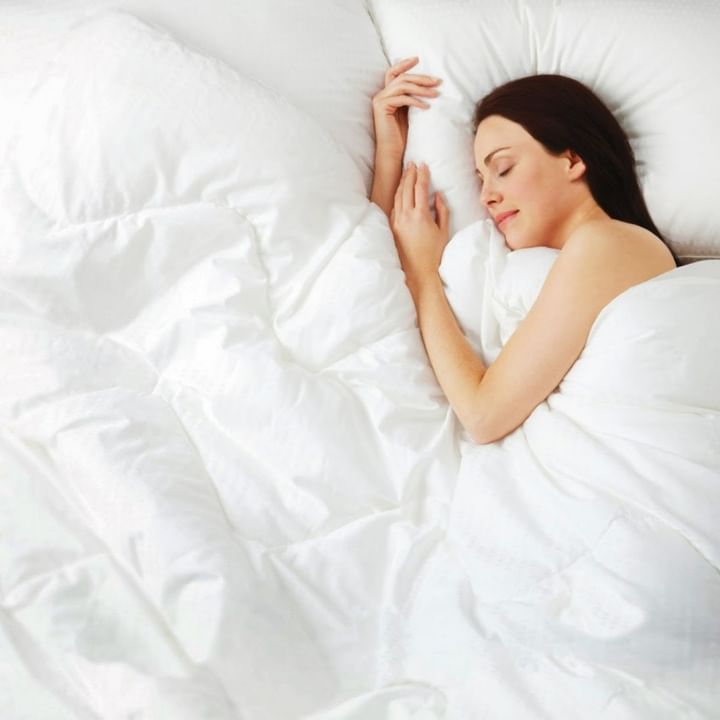Get the App
For Doctors
Login/Sign-up
Last Updated: Aug 29, 2019
BookMark
Report
What really happens to your body when you’re sleeping?
What really happens to your body when you’re sleeping?
Did you know that you spend 1/3rd of your life sleeping? Sleep allows your body to repair and detoxify itself after a hard day’s work. When you’re sleeping, a plethora of activities take place in your body, which are essential for your physical, emotional and mental well-being. Read on to find out what happens to your different body parts after you’ve drifted off…
Brain
Even though activity in the brain’s cortex (the outer part of the brain) falls by about 40% in the first few stages of sleep, your brain still continues to remain extremely active; especially in the final stage. During the REM phase your brain activity increases with your blood flow rising considerably in those areas of the brain that are responsible for processing emotional experiences and memories.
Eyes
Like the brain, even the eyes are active when you’re asleep and the movement of your eyes is indicative of the different stages of sleep. REM (rapid eye movement) sleep denotes deep sleep and occurs in the first 90 minutes of falling asleep (which is dreamless sleep). On the other hand, NREM sleep (non-rapid eye movement) is when you’re dreaming and your sleep quality is rather poor in comparison. This takes place during the later part of your sleep.
Immune system
Your immune system is also hard at work during sleep. It increases the production of certain kinds of proteins that help the body to fight against infections. Poor sleep can cause the body’s immune system to weaken, making you vulnerable to chronic infections.
Body temperature
During sleep, your body’s temperature goes down as there’s a slowing down of the body’s metabolic rate, leading to burning of fewer calories. Additionally, a low body temperature is essential for allowing your body to rest and repair.
Skin
During the day, your skin experiences sun damage and is in the continuous process of shedding away dead skin cells. To repair the damage caused by external factors as well as loss through shedding, is why the metabolic rate of your skin is at its peak when you’re sleeping. It is at this time when your cells witness increased production and a reduced breakdown of protein, which helps in repairing your skin and keeping it young and healthy.
Mouth
The mouth is also a place of decreased activity when you sleep. When you sleep, your saliva production sees a drop, leading to the common morning condition of a dry mouth. During the day this is not so as saliva is constantly produced to keep your mouth hydrated.
Muscles
During sleep your body changes its position about 35 times, but despite the changes, the muscles of the body are always in a relaxed state. This enables the tissues to restore and repair themselves.
Digestive system
Since your body’s requirement for energy is low during sleep time, the pace of activity in the digestive system notices a slowdown. The body’s inactive state prevents stomach acids and enzymes from turning the food into energy.
Hormones
While hormone levels of corticosteroids (stress hormone) and adrenaline fall during sleep, there’s an increase in your body’s production of the growth hormone (which promotes the maintenance, growth and repair of your bones and muscles). The hormone melatonin, which is responsible for the sleep-wake cycle, rises during sleep as well. Additionally, sex, fertility and hair follicle stimulating hormones are secreted more during sleep.
Blood
Your heart rate decreases by 10 to 30 beats per minute when you’re asleep, which causes a decline in your blood pressure as well. Your blood is responsible for the disposal of toxins from your body. During rest, there’s a decrease in the breakdown of tissues and cells, which allows the body to repair them. Furthermore, during the state of sleep, your blood tends to flow from the brain causing your arteries to expand and your limbs to become bigger.
Did you know that you spend 1/3rd of your life sleeping? Sleep allows your body to repair and detoxify itself after a hard day’s work. When you’re sleeping, a plethora of activities take place in your body, which are essential for your physical, emotional and mental well-being. Read on to find out what happens to your different body parts after you’ve drifted off…
Brain
Even though activity in the brain’s cortex (the outer part of the brain) falls by about 40% in the first few stages of sleep, your brain still continues to remain extremely active; especially in the final stage. During the REM phase your brain activity increases with your blood flow rising considerably in those areas of the brain that are responsible for processing emotional experiences and memories.
Eyes
Like the brain, even the eyes are active when you’re asleep and the movement of your eyes is indicative of the different stages of sleep. REM (rapid eye movement) sleep denotes deep sleep and occurs in the first 90 minutes of falling asleep (which is dreamless sleep). On the other hand, NREM sleep (non-rapid eye movement) is when you’re dreaming and your sleep quality is rather poor in comparison. This takes place during the later part of your sleep.
Immune system
Your immune system is also hard at work during sleep. It increases the production of certain kinds of proteins that help the body to fight against infections. Poor sleep can cause the body’s immune system to weaken, making you vulnerable to chronic infections.
Body temperature
During sleep, your body’s temperature goes down as there’s a slowing down of the body’s metabolic rate, leading to burning of fewer calories. Additionally, a low body temperature is essential for allowing your body to rest and repair.
Skin
During the day, your skin experiences sun damage and is in the continuous process of shedding away dead skin cells. To repair the damage caused by external factors as well as loss through shedding, is why the metabolic rate of your skin is at its peak when you’re sleeping. It is at this time when your cells witness increased production and a reduced breakdown of protein, which helps in repairing your skin and keeping it young and healthy.
Mouth
The mouth is also a place of decreased activity when you sleep. When you sleep, your saliva production sees a drop, leading to the common morning condition of a dry mouth. During the day this is not so as saliva is constantly produced to keep your mouth hydrated.
Muscles
During sleep your body changes its position about 35 times, but despite the changes, the muscles of the body are always in a relaxed state. This enables the tissues to restore and repair themselves.
Digestive system
Since your body’s requirement for energy is low during sleep time, the pace of activity in the digestive system notices a slowdown. The body’s inactive state prevents stomach acids and enzymes from turning the food into energy.
Hormones
While hormone levels of corticosteroids (stress hormone) and adrenaline fall during sleep, there’s an increase in your body’s production of the growth hormone (which promotes the maintenance, growth and repair of your bones and muscles). The hormone melatonin, which is responsible for the sleep-wake cycle, rises during sleep as well. Additionally, sex, fertility and hair follicle stimulating hormones are secreted more during sleep.
Blood
Your heart rate decreases by 10 to 30 beats per minute when you’re asleep, which causes a decline in your blood pressure as well. Your blood is responsible for the disposal of toxins from your body. During rest, there’s a decrease in the breakdown of tissues and cells, which allows the body to repair them. Furthermore, during the state of sleep, your blood tends to flow from the brain causing your arteries to expand and your limbs to become bigger.



+1.svg)
